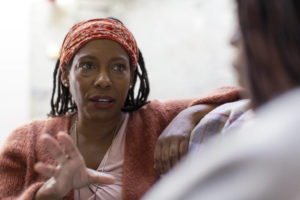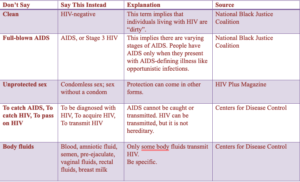 A national epidemic like HIV should make you look up and pay attention. Unfortunately, many people are looking everywhere except where they should. They are looking with judgment at others, they are looking with pity at statistics, and they are even looking with paranoia over their shoulders.
A national epidemic like HIV should make you look up and pay attention. Unfortunately, many people are looking everywhere except where they should. They are looking with judgment at others, they are looking with pity at statistics, and they are even looking with paranoia over their shoulders.
But one of the ugly monsters that contribute to the rise in HIV is the oppressive, stigmatizing language we use to talk about the people living with it. And like many who unknowingly sustain oppression and racism in our culture, when it comes to HIV and stigma, we rarely look where we should: in the mirror.
Even if your HIV status is negative or undetectable, you have a responsibility to eliminate stigma. According to the Centers for Disease Control, negative attitudes and discriminatory behavior toward people living with HIV can make them less likely to get tested or seek treatment. This is because stigma causes isolation, feelings of shame and fear of disclosing one’s status. Hence, stigma is a contributor to the overall rise or stagnation in HIV diagnoses. That should set off all of our alarm bells.
When you consider that African Americans account for 44% of HIV diagnosis, we should all rush to the frontlines to fight stigma in all forms. Misconceptions and fear about HIV—stigma—are often perpetuated in everyday conversations.
The language we use can create stigma by reinforcing negative stereotypes. Yet language can also disrupt stigma by affirming those living with HIV. Best said by the National Black Justice Coalition, words can facilitate healing.
An easy start to cleaning up our mouths isemploying people-first language. This places the person before the medical condition and does assign HIV to a person’s identity. So instead of saying “the HIV-positive woman,” say, “the woman living with HIV.” It’s important to recognize that phrases that seem harmless may actually be outdated, off-putting or downright derogatory. Whatever level of stigma such words and phrases bring, they should all be muted from our lips.
The below language-fixes are simple but powerful tools in combatting stigma:

Remember, this is just your starter kit. The National Association of LGTBQ Journalists, the National Black Justice Coalition and the CDC’s Let's Stop HIV Together resources have published language and style guides to help you dig a little deeper to fight stigma – starting with your tongue.
National Women and Girls HIV/AIDS Awareness Day is on March 10.









